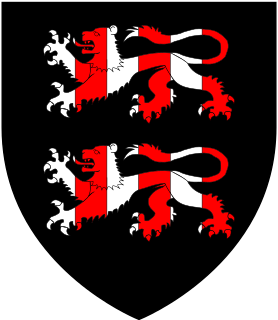Related Research Articles

Richard Hampden was an English Whig politician and son of Ship money tax protester John Hampden. He was sworn a Privy Counsellor in 1689 and was Chancellor of the Exchequer from 18 March 1690 until 10 May 1694.

Sir Allen Apsley, 28 August 1616 to 15 October 1683, was a Royalist soldier and administrator during the Wars of the Three Kingdoms, who took part in the Second Anglo-Dutch War. He was also MP for Thetford from 1661 to 1679. One biographer describes him as having an "ability to maintain friendly contact with figures across a wide range of affiliations, which helped to make him a successful political fixer".

Sir John Northcote, 1st Baronet was an English politician who sat in the House of Commons at various times between 1640 and 1676. He supported the Parliamentarian cause in the English Civil War.
Richard Norton of Southwick Park, was an English landowner and politician who sat in the House of Commons at various times between 1645 and 1691. He was a colonel in the parliamentary army in the English Civil War and for a time he commanded the Parliamentary forces besieging Basing House. He was Governor of Portsmouth for Parliament during the Civil War and for Charles II after the Restoration.

Sir Bennet Hoskyns, 1st Baronet (1609–1680) was an English politician who sat in the House of Commons variously between 1640 and 1659.
Thomas Gewen was an English politician who sat in the House of Commons variously between 1645 and 1660.
Sir Thomas Barnardiston, 1st Baronet was an English baronet, landowner, soldier and MP who sat in the House of Commons at various times between 1640 and 1659. He fought on the Parliamentary side in the English Civil War.

Sir John Strangways of Melbury House, Melbury Sampford, Somerset, and of Abbotsbury in Dorset, was an English politician who sat in the House of Commons variously between 1614 and 1666. He supported the Royalist side in the English Civil War.

Sir Robert Croke was an English lawyer and politician who sat in the House of Commons between 1640 and 1643.

Sir Thomas Wharton was an English politician who sat in the House of Commons in 1659 and 1660.
Sir Hugh Bethell was an English politician who sat in the House of Commons at various times between 1654 and 1679.
John Swinfen was an English politician who sat in the House of Commons variously between 1645 and 1691. He supported the Parliamentary cause in a civil capacity in the English Civil War.
Herbert Morley was an English politician who sat in the House of Commons variously between 1640 and 1667. He fought for the Parliamentary army in the English Civil War. Later he was appointed Lieutenant of the Tower of London.

Sir Ralph Knight was an English soldier and politician who sat in the House of Commons in 1660. He served in the Parliamentary army in the English Civil War. He sold 'the Barrels' Manor House in Ullenhal Worcestershire to his cousin to join Cromwell. The Manor had been in the family since the early 1500s.
Arthur Owen was a Welsh politician who sat in the House of Commons at various times between 1645 and 1678. He fought in the Parliamentary army in the English Civil War.
James Thurbarne (1607–1688) was an English politician who sat in the House of Commons at various times between 1656 and 1679.
Henry Mildmay was an English politician who sat in the House of Commons at various times between 1654 and 1692. He fought in the Parliamentary army in the English Civil War.

Chaloner Chute (1632–1666) was an English lawyer and politician who sat in the House of Commons in 1659 and 1661.
Joseph Brand was an English merchant, landowner and politician who sat in the House of Commons in 1660.

Sir John Davie, 2nd Baronet (1612–1678) of Creedy in the parish of Sandford, Devon, was Member of Parliament for Tavistock, Devon, in 1661 and was Sheriff of Devon from 1670 to 1671.